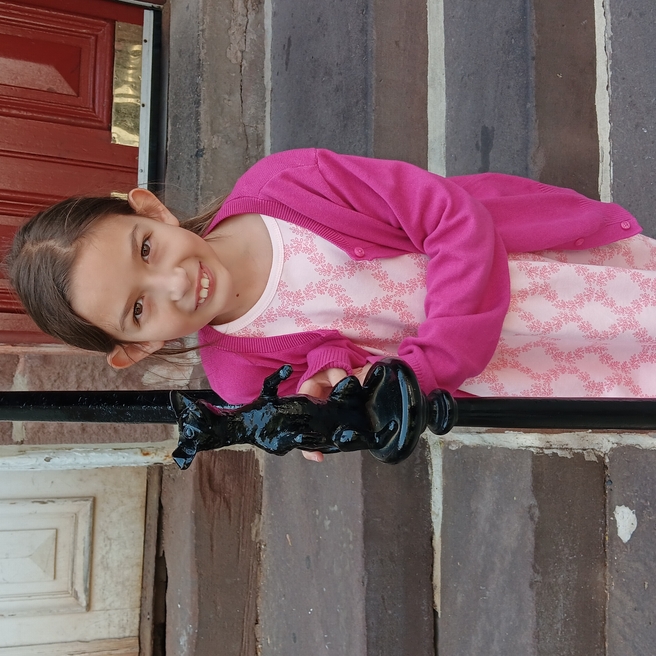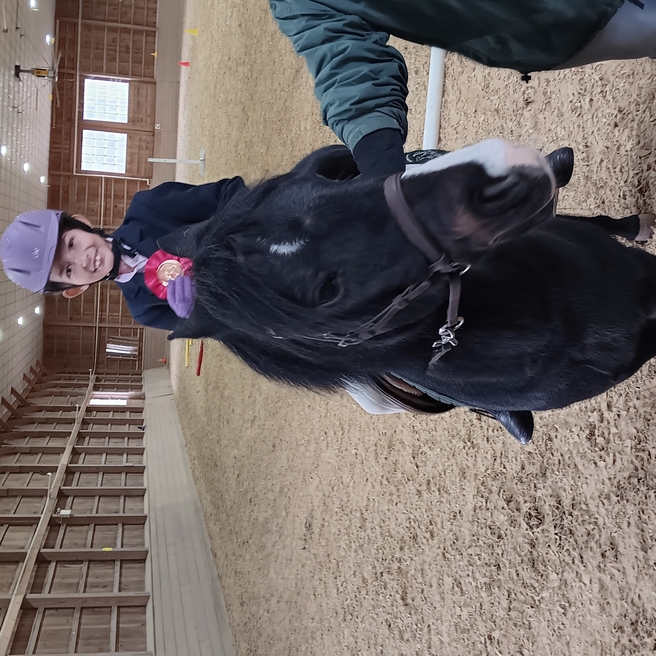Gloriana: NEBULA Program
Gloriana: NEBULA Program
NEBULA Program: Gloriana’s story
Controlling her bowels and bladder was difficult for Gloriana. Her parents worked with many wonderful specialists to help Gloriana improve her urinary incontinence and chronic constipation, but found it difficult to coordinate the different treatments and approaches.
All that changed two years ago when Gloriana, then 8, became a part of a new, collaborative program at Children’s Hospital of Philadelphia. The program, NEBULA, stands for the NEuromodulation, Bowel and UroLogic Alliance. It brings together specialists from the Division of Urology, Department of General Surgery and Division of Gastroenterology (GI) to use their combined expertise to help children facing complex pediatric bladder and bowel dysfunction (BBD) issues.
“She’s doing so well now,” Gloriana’s mother, Julianna, says. “With the program, all these different doctors — GI, Urology, Surgery — are talking together, working together with one purpose: How do we help Gloriana? They came up with ideas together that are working.”
One-of-a-kind genetic mutation

Gloriana’s congenital anomalies are thought to be connected to a mutation in the SUMO 2 gene. So far, she’s the only person in the world identified as having this particular mutation.
The numerous differences include short ribs, a horseshoe-shaped kidney, a curved left foot (causing frequent falls) and placement of her anus and vaginal openings very close together. Gloriana required surgery at 6 months old to create more space. Even with this surgery, the close proximity contributed to recurrent urinary tract infections (UTIs) and both fecal and urinary incontinence.
She also experienced developmental delays, so it took her longer to talk, longer to walk and made it harder for her to learn than her peers. Frequent hospitalizations for UTIs and the bacterium Clostridioides difficile, better known as C. diff, made keeping up in school even more difficult.
“Before we came to NEBULA, we didn’t know what to do because her issues were so complicated,” Julianna says. Gloriana’s dad, Domenico says, “Everything is connected, so if you try to fix one thing, it complicates something else. That’s what makes CHOP so helpful. They see the whole picture.”
NEBULA’s comprehensive approach even includes ensuring her school accommodations were restored after her school had removed support services that helped Gloriana catch up with her classmates. “They advocated for her, and we got her aide back,” Julianna says. “That was huge.”
The treatment plan
To address Gloriana’s painful chronic constipation, NEBULA started her on an enema program, to regularly clear her bowels.
“It has really helped,” her mother says. “It began with daily treatment, moved to every other day and then gradually became further and further apart as Gloriana began taking more control over her bowel movements. Now, she rarely needs an enema.”
Gloriana also has diverticula in her bladder, a condition that created a pouch within it — almost like a second bladder — that makes it difficult to fully void, leading to urinary incontinence. The CHOP team is addressing that through medication, physical therapy to strengthen her pelvic floor and behavior changes. Her promising progress allowed the NEBULA team to postpone surgery to fix the diverticula.
Gloriana’s big role
At the heart of the plan is Gloriana, now 10, taking personal responsibility for following her routine.
She has a card that lists each task she needs to do every day: drink eight cups of water, do her physical therapy, take her medicines twice daily, pee every two hours and poop once a day. If she completes the list, she gets a reward. She usually chooses to watch her favorite “satisfying” YouTube videos, which show people crafting or making things.
“The plan is hard; it’s a lot for a kid to follow,” Julianna says. “But she needs it, and it’s working.”
A key member of Gloriana’s team is GI psychologist Elizabeth Turner, PhD. “Working with Dr. Turner has helped Gloriana comply with the plan,” Julianna says. “Dr. Turner helps her understand that she has to do things that other kids don’t have to do, but they are things that are important so she can get better.”
Progress!

Because her elimination is more consistent, Gloriana has been able to eat more without inducing belly pain, so she is gaining needed weight.
“It’s not a cure, but she’s able to manage her symptoms so she can do the things she likes,” Dominico says.
Those things include therapeutic horseback riding, Irish step dance, singing, baking, Cub Scouts and camping trips. “She’s working on building a chest for her camping gear, using tips from the videos she watches,” Julianna says.
Gloriana is always up for an adventure, be it museums, parks or other family travels. She’s limited in how far she can walk, but she’s happy to be pushed in a stroller so she doesn’t miss anything.
One of her favorite places is Dutch Wonderland, a kid-themed amusement park in Lancaster County.
“She has a spicy personality. She bosses her older brother, Lorenzo, around,” says Domenico. “She’s really funny, too. She has a lot of friends. Everybody loves her.”
Advice is a call away
If an issue arises, Gloriana’s parents know the NEBULA team is ready to help. “I call the nurse coordinator or ask questions through MyCHOP,” the hospital’s online patient portal, Julianna says, “and someone gets back to me right away. I don’t have to figure out if I should call GI or Urology. With NEBULA, everything we need is in one place.”
For example, Gloriana still wears pullups because she sometimes leaks urine. “Even though she’s gotten so much better, she’s scared to wear regular underwear,” Julianna says. Working with Dr. Turner, Gloriana is practicing wearing briefs a few hours at home each day to build confidence. The goal is to have her in underwear fulltime.
“No one knows if this is as good as it gets, because she is such a unique case,” her mom says. “But we’ve seen some serious progress, and we’re grateful for CHOP’s help to get her this far.”
Domenico concludes, “Gloriana is resilient, and she’s strong. I’m proud of how hard she’s working to get better.”